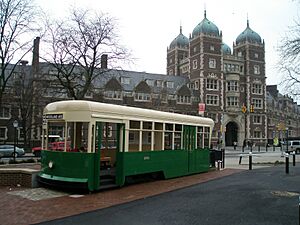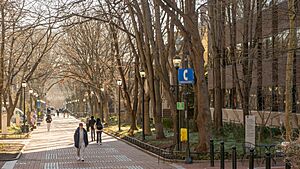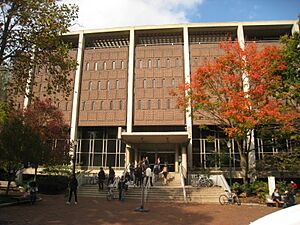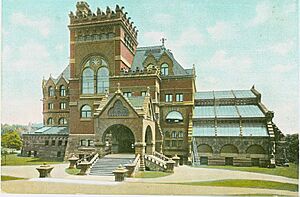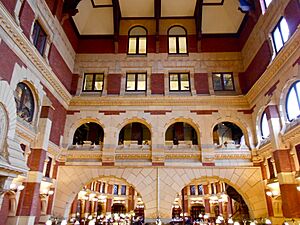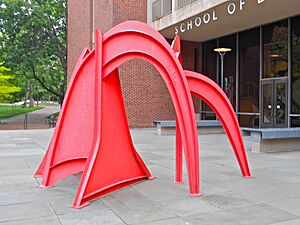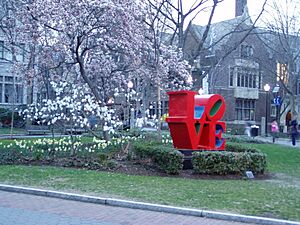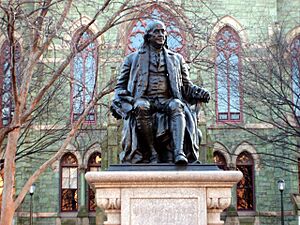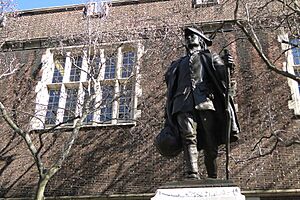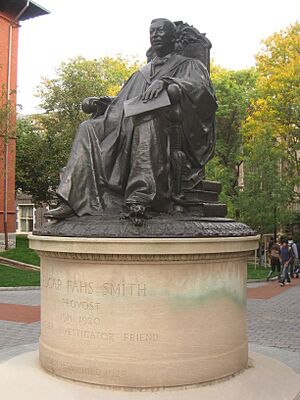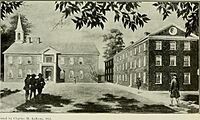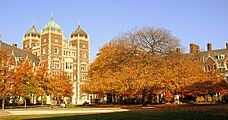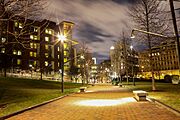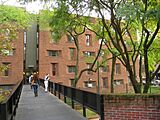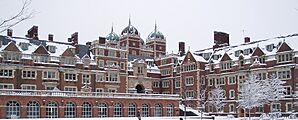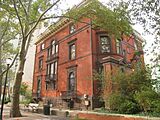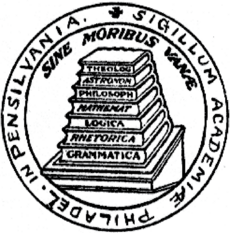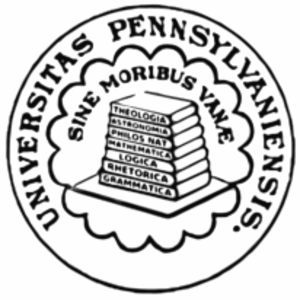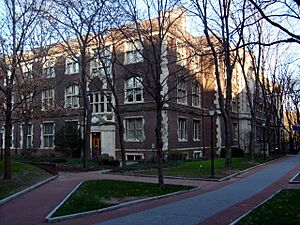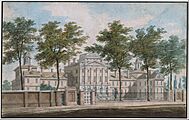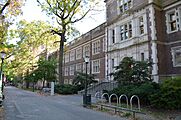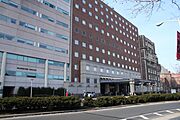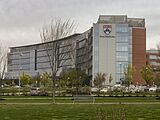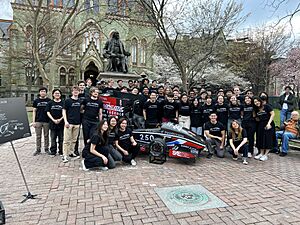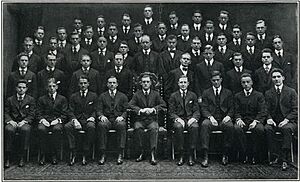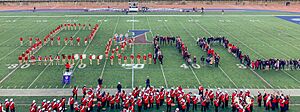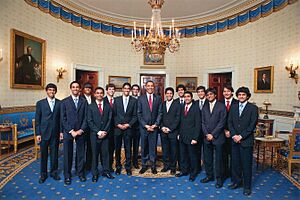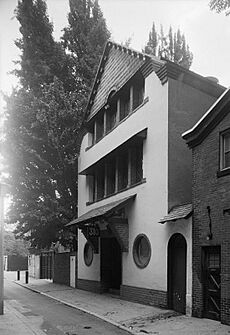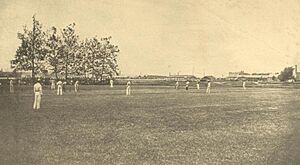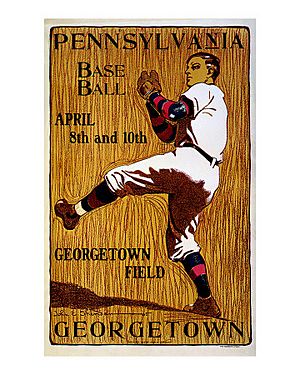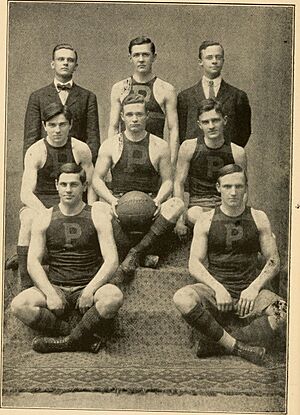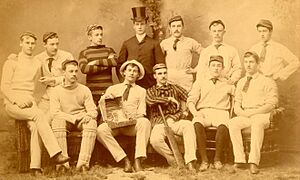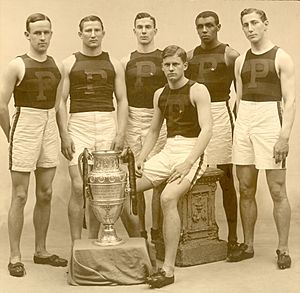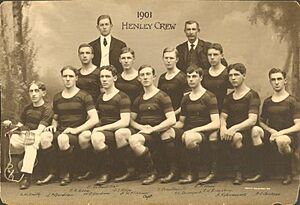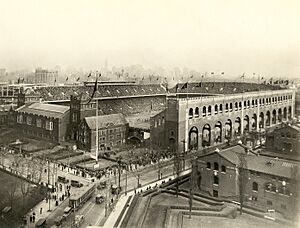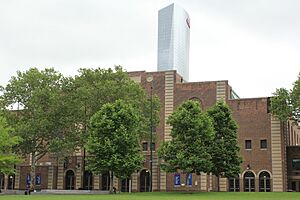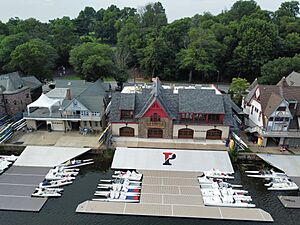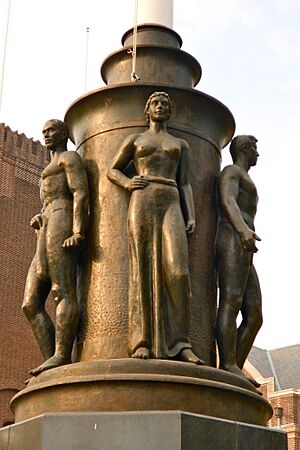University of Pennsylvania facts for kids
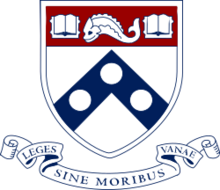
Coat of arms
|
|
| Latin: Universitas Pennsylvaniensis | |
|
Former names
|
|
|---|---|
| Motto | Leges sine moribus vanae (Latin) |
|
Motto in English
|
"Laws without morals are useless" |
| Type | Private research university |
| Established | November 14, 1740 |
| Founder | Benjamin Franklin |
| Accreditation | MSCHE |
|
Academic affiliations
|
|
| Endowment | $22.3 billion (2024) |
| Budget | $4.4 billion (2024) |
| President | J. Larry Jameson |
| Provost | John L. Jackson Jr. |
|
Academic staff
|
4,793 (2018) |
|
Total staff
|
39,859 (fall 2020; includes health system) |
| Students | 23,374 (fall 2022) |
| Undergraduates | 9,760 (fall 2022) |
| Postgraduates | 13,614 (fall 2022) |
| Location |
,
Pennsylvania
,
United States
39°57′01″N 75°11′41″W / 39.95028°N 75.19472°W |
| Campus | Large city,
|
| Newspaper | The Daily Pennsylvanian |
| Colors | Blue and Red |
| Nickname | Quakers |
|
Sporting affiliations
|
|
| Mascot | The Quaker |
 |
|
The University of Pennsylvania (often called Penn or UPenn) is a private Ivy League research university in Philadelphia, Pennsylvania, United States. It is one of the oldest universities in the country. It was started in 1755 thanks to Benjamin Franklin. He wanted an educational place that would train leaders in many fields.
Penn has four schools for undergraduate students and 12 schools for graduate and professional students. The undergraduate schools include the College of Arts and Sciences, the School of Engineering and Applied Science, the Wharton School, and the School of Nursing. Its graduate schools include its law school, which had a professor, James Wilson, who helped write the U.S. Constitution. Its medical school was the first in North America.
In 2023, Penn was ranked third among U.S. universities for how much money it spent on research. As of 2024, its endowment (money it has saved) was $22.3 billion. This makes it one of the wealthiest private schools in the nation. Penn's main campus is in the University City area of West Philadelphia. It is built around College Hall. Famous spots on campus include Houston Hall, the first modern student union, and Franklin Field, the nation's first two-level college football stadium. It is also the longest-running NCAA Division I college football stadium. Penn's sports teams are called the Penn Quakers. They have teams in 33 sports and are part of the Ivy League.
Many important people have been part of Penn. This includes eight Founding Fathers of the United States who signed the Declaration of Independence. Seven others signed the U.S. Constitution. Two Presidents of the United States also attended Penn. The university has also been home to 38 Nobel Prize winners.
Contents
University History
In 1740, people in Philadelphia planned to build a large hall for a speaker named George Whitefield. This building was the biggest in Philadelphia at the time. Thousands of people came to hear Whitefield speak there.
In 1749, Benjamin Franklin, a famous Founding Father, shared his idea for a "Public Academy of Philadelphia." He wrote about it in a pamphlet.
On June 16, 1755, the College of Philadelphia was officially started. This allowed them to add classes for undergraduate students.
Penn says it is the fourth-oldest university in the United States. However, other universities like Princeton and Columbia disagree. They point out that the College of Philadelphia did not start classes until 1755.
Exploring the Campus
The University of Pennsylvania's campus covers about 299 acres in West Philadelphia. It has a mix of old and new buildings. Important places include the Perelman Center for Advanced Medicine and the Penn Museum. The Pennovation Center is a new place for new ideas and businesses.
Much of Penn's campus was designed by the firm Cope and Stewardson. These architects were also professors at Penn. They were known for mixing the Gothic architecture of University of Oxford and University of Cambridge with local styles. This created the Collegiate Gothic look.
Locust Walk is the main path through Penn's Campus Historic District. It is a walkway just for people. It was first planned in 1948 and finished in 1972.
Penn's main campus is in the University City area of West Philadelphia. All of Penn's schools and most research centers are on this campus. The area around the campus has restaurants, shops, and a movie theater. Penn's campus is close to Drexel University and Saint Joseph's University.
The Wistar Institute, a cancer research center, is also on Penn's campus. A new building was added in 2014. This helps the university and the Wistar Institute work together even more.
In 2010, Penn bought 23 acres across the Schuylkill River. This was a big expansion. In 2016, Penn finished designing and updating a former paint factory. This new area is called Pennovation Works. It has shared workspaces and labs for new technology companies. Penn hopes this area will help academics and business people work together.
Campus Parks and Gardens
In 2007, Penn bought about 35 acres near the Schuylkill River. This area used to be the Philadelphia Civic Center. Another 24-acre site was also bought. These areas are now used for education, research, and other facilities. The first part, a park and sports fields, opened in 2011.
In September 2011, Penn finished building the $46.5 million, 24-acre Penn Park. This park has places for fun and sports. It has trees, lawns, and open fields. It is located east of the Highline Green.
Penn has two special gardens called arboreta. The first is the Penn Campus Arboretum, which covers the entire main campus. It is like an urban forest with over 6,500 trees of 240 different types. It also has ten special gardens and five urban parks. The second arboretum, Morris Arboretum, is 92 acres. It has more than 13,000 labeled plants from around the world.
New Bolton Center
Penn also owns the 687-acre New Bolton Center. This is a research and animal health care center for its veterinary school. It is located near Kennett Square. New Bolton Center became famous when the Kentucky Derby winner Barbaro had surgery there.
University Libraries
Penn's library system has 300 full-time staff members. Its budget is over $95 million. The libraries have 6.19 million books and other items. They also have over 1.11 million e-books.
The university has 19 libraries. Van Pelt Library is the main library on Penn's campus. Other libraries include:
- The Annenberg School for Communication library.
- The Archaeology and Anthropology Library at the Penn Museum.
- The Biddle Law Library at the School of Law.
- The Chemistry Library in the Chemistry Building.
- The Dental Medicine Library at the Dental School.
- The Fisher Fine Arts Library.
- The Holman Biotech Commons library at the Medical and Nursing Schools.
- The Humanities and Social Sciences Library, inside Van Pelt Library.
- The Katz Center for Advanced Judaic Studies library.
- The Lea Library, with a collection of Catholic Church history, inside Van Pelt Library.
- The Lippincott Business Library, inside Van Pelt Library.
- The Math/Physics/Astronomy library.
- The Rare Books and Manuscripts library, inside Van Pelt Library.
- The Veterinary Medicine Library, with a satellite library at New Bolton Center.
Penn also stores books and records off campus in a special facility.
The Penn Design School's Fine Arts Library was built to be Penn's main library. It was the first library in the nation to separate the book storage areas from the reading rooms.
Art on Campus
The campus has more than 40 important art pieces. This is partly because of a 1959 rule in Philadelphia. This rule says that 1% of the budget for new buildings must be used for public art. Many alumni have also given art to Penn.
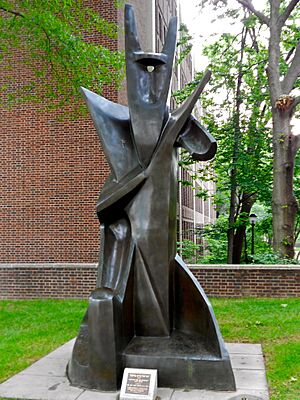
Alexander Archipenko's sculpture of King Solomon was given to Penn in 1995. It honors the start of Judith Rodin's time as Penn president.
In 2020, Penn put up Brick House, a large sculpture by Simone Leigh. It is near the entrance to College Green. This 5,900-pound bronze sculpture is 16 feet high. It shows an African woman's head on a shape that looks like a skirt or a clay house.
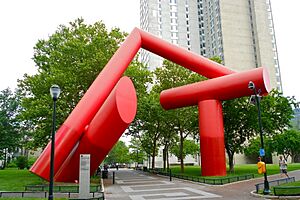
The Covenant is a large red sculpture by Alexander Liberman. It is located on Locust Walk. It was installed in 1975 and is made of steel.
A white button sculpture, officially called the Split Button, is also on campus. It was designed by Claes Oldenburg. It sits at the south entrance of Van Pelt Library. Its buttonholes are big enough for people to stand inside. Penn also has a copy of the Love sculpture by Robert Indiana. It was put up in 1998 overlooking College Green.
In 2019, the Association for Public Art loaned two large sculptures to Penn. These are Social Consciousness by Sir Jacob Epstein and Atmosphere and Environment XII by Louise Nevelson.
Penn also has several traditional statues. These include one of Young Ben Franklin, made by R. Tait McKenzie. It is located near Franklin Field. The sculpture is called Benjamin Franklin in 1723.
Another sculpture by McKenzie is of former Penn provost Edgar Fahs Smith.
Penn is currently looking at all its public art. Some art pieces have been moved or removed. For example, a statue of Reverend George Whitefield was removed in 2020. Research showed that Whitefield had owned enslaved people.
Penn Museum
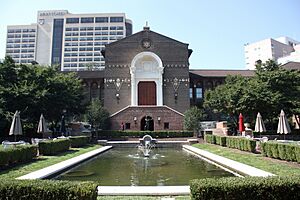
The Penn Museum was founded in 1887. Since then, it has been part of 400 research projects worldwide. The museum's first project was digging in Nippur, which is now in Iraq.
The Penn Museum has the largest real sphinx in North America. It is about seven feet high, four feet wide, and 13 feet long. It weighs 12.9 tons and is made of solid red granite.
The sphinx was found in 1912 by Sir William Matthew Flinders Petrie. He found it during a dig in the ancient Egyptian city of Memphis, Egypt. The sphinx used to guard a temple there. Penn helped pay for Petrie's trip, so he offered the sphinx to the university. It was moved to the museum in 1913. In 2019, the sphinx was moved to a more visible spot to attract visitors.
The museum has three floors of galleries. They display items from Egypt, the Middle East, Mesoamerica, Asia, the Mediterranean, Africa, and Native American cultures. One of its most famous items is a goat statue from the royal tombs of Ur.
Other Penn Museums and Galleries
Penn has a website that shows where to find its small museums and galleries. It lists over one hundred places on campus where the public can see Penn's art collection. This collection has over 8,000 artworks. The largest art gallery is the Institute of Contemporary Art. It shows different art exhibits throughout the year. The Arthur Ross Gallery, located at the Fisher Fine Arts Library, has housed Penn's art collection since 1983.
Student Homes
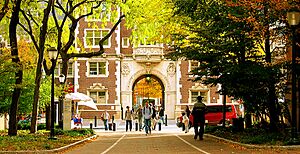
Every College House at Penn has at least four faculty members. They serve as House Deans, Faculty Masters, and College House Fellows. Penn also has nearly 40 themed living programs. These are for students who share interests like world cinema or science. Many students also rent homes and apartments near campus after their first year.
The College Houses include W.E.B. Du Bois, Fisher Hassenfeld, Gregory, Gutmann, Harnwell, Harrison, Hill College House, Kings Court English, Lauder, Riepe, Rodin, Stouffer, and Ware. The first College House was Van Pelt College House, started in 1971. It was later renamed Gregory House. Fisher Hassenfeld, Ware, and Riepe are all part of one building called "The Quad." The newest College House, Gutmann, opened in 2021.
Older students (Juniors or Seniors) can live in sororities and fraternities. These are managed by three student-run groups.
-
Hill College House, a dormitory designed in 1958 by Eero Saarinen.
How Penn is Organized
The College of Arts and Sciences is for undergraduate students. The School of Arts and Sciences also has graduate programs. The Wharton School is Penn's business school. Other schools with undergraduate programs include the School of Nursing and the School of Engineering and Applied Science (SEAS).
The current interim president is J. Larry Jameson.
Campus Police
The University of Pennsylvania Police Department (UPPD) is the largest private police department in Pennsylvania. It has 117 members. All officers are sworn police officers. They have law enforcement power on campus.
University Seal
The official seal of the University of Pennsylvania is used to show that documents are real. The newest design was approved in 1932 and is still used today.
The outer part of the seal says "Universitas Pennsylvaniensis," which is Penn's Latin name. Inside, there are seven books on a desk. The books have titles of subjects like Theology, Astronomy, Philosophy, Mathematics, Logic, Rhetoric, and Grammar. These were parts of a classic education. Between the books and the outer ring is the university's Latin motto: "Leges Sine Moribus Vanae."
Academics at Penn
Penn has a rule called "One University Policy." This allows students to take classes in any of Penn's twelve schools.
Penn focuses on learning and research that combines different subjects. It offers programs where students can earn two degrees. Penn's "One University" policy lets undergraduate students take courses at all of Penn's schools, except for the medical, veterinary, and dental schools. Undergraduates can also take classes at Bryn Mawr, Haverford, and Swarthmore. This is part of an agreement called the Quaker Consortium.
Admissions to Penn
| 2022 | 2019 | 2018 | 2017 | |
|---|---|---|---|---|
| Applicants | 54,588 | 44,961 | 44,491 | 40,413 |
| Admits | 3,404 | 3,446 | 3,740 | 3,757 |
| Admit rate | 4.24% | 6.66% | 7.41% | 8.30% |
| Enrolled | 2,417 | 2,400 | 2,518 | 2,456 |
| Yield | 68.18% | 69.65% | 67.33% | 65.37% |
| SAT range* | 1510–1560 | 1450–1560 | 1440–1560 | 1420–1560 |
| ACT range* | 34–36 | 33–35 | 32–35 | 32–35 |
* SAT and ACT ranges are from the 25th to the 75th percentile. Getting into Penn as an undergraduate is very competitive. Admissions officers look closely at a student's GPA. High school class rank and letters of recommendation are also very important. For students from the U.S., Canada, and Mexico, admission is "need-blind." This means their ability to pay does not affect their admission decision.
For the class entering in Fall 2022, the university received 54,588 applications. The Atlantic ranked Penn among the 10 most selective schools in the country. For graduate programs, Penn's most selective schools include its law school and health care schools.
Special Programs and Degrees
Penn offers special programs where students can earn two degrees at once. These are called coordinated dual-degree (CDD) programs. Students in these programs earn degrees from different schools at the university. There are also faster-paced and interdisciplinary programs. These undergraduate programs include:
- Huntsman Program in International Studies and Business
- Jerome Fisher Program in Management and Technology (M&T)
- Roy and Diana Vagelos Program in Life Sciences and Management (LSM)
- Nursing and Health Care Management (NHCM)
- Roy and Diana Vagelos Integrated Program in Energy Research (VIPER)
- Vagelos Scholars Program in Molecular Life Sciences (MLS)
- Singh Program in Networked and Social Systems Engineering (NETS)
- Digital Media Design (DMD)
- Computer and Cognitive Science: Artificial Intelligence
- Accelerated 7-Year Bio-Dental Program
- Accelerated 6-Year Law and Medicine Program
The School of Social Policy and Practice, also known as Penn SP2, is a graduate school. It offers degrees in social policy and social work. It also has several dual degree programs. Penn SP2 aims to pursue social innovation and justice.
The School of Veterinary Medicine offers five dual-degree programs. These combine the Doctor of Veterinary Medicine (VMD) with other master's or doctoral degrees. These programs help veterinarians work in areas like human health and animal welfare.
Medical Center and Research
In 2018, Penn's nursing school was ranked number one. Its School of Veterinary Medicine was ranked sixth. In 2019, the Perelman School of Medicine was named the third-best medical school for research.
The University of Pennsylvania Health System (UPHS) is a group of hospitals. It is owned by the University of Pennsylvania. UPHS and the Perelman School of Medicine together form Penn Medicine. This is a clinical and research part of the university. UPHS hospitals include the Hospital of the University of Pennsylvania and Pennsylvania Hospital. Penn Medicine owns and runs the first hospital in the United States, the Pennsylvania Hospital. It also has America's first surgical theater.
-
The Pennsylvania Hospital painted in 1811.
International Study Opportunities
Students can study abroad for a semester or a year. Penn has partnerships with universities around the world. These include schools in Singapore, London, Edinburgh, Hong Kong, and Melbourne.
Reputation and Rankings
| ARWU World | 14 |
|---|---|
| THES World | 14 (tie) |
| USNWR National University | 10 |
| Washington Monthly National University | 3 |
| Forbes | 8 |
U.S. News & World Report ranked Penn 6th among 394 national universities in the U.S. in 2024. The Princeton Review student survey ranked Penn 7th in their Dream Colleges list in 2023. Penn was ranked 4th in the U.S. by College Factual for 2024. In 2023, Penn was ranked as having the 7th happiest students in the United States.
Among its professional schools, the school of education was ranked number one in 2021. The Wharton School was ranked number one in 2022 and 2024. Many other schools, like communication, dentistry, medicine, nursing, law, and veterinary schools, rank in the top 5 nationally.
Research at Penn

Penn is known as an "R1" doctoral university, meaning it has "Highest research activity." Its work added $14.3 billion to Pennsylvania's economy in 2015. Penn spent over $1.9 billion on research in 2023. This ranked it third among U.S. universities for research and development spending.
Penn's research centers often combine two or more subjects. In 2010–2011, five new or expanded interdisciplinary research centers were created. Penn now has 165 research centers. These centers have over 4,300 faculty members and many other staff and students.
Penn also produces many doctoral students. In 2009, 487 PhDs were awarded. Penn ranks third in the Ivy League for this.
Penn's research has led to many important discoveries. The first general-purpose electronic computer (ENIAC) was created at Penn in 1946. The world's first spelling and grammar checkers were also made here. The popular COBOL programming language was developed at Penn.
Many important medical discoveries have happened at Penn. The dialysis machine was partly developed by a Penn student. The Rubella and Hepatitis B vaccines were also developed at Penn. Other discoveries include cancer's link with genes, cognitive therapy, and the technology behind PET Scans. Recent gene research has led to finding genes for conditions like fragile X syndrome.
Penn professors Alan J. Heeger, Alan MacDiarmid, and Hideki Shirakawa invented a process for conductive polymers. This earned them the Nobel Prize in Chemistry.
Student Life
| Ethnic enrollment, fall 2018 |
Number (percentage) of undergraduates |
|---|---|
| African American | 715 (7.1%) |
| Native American | 12 (0.1%) |
| Asian American and Pacific Islander |
2,084 (20.7%) |
| Hispanic and Latino American |
1,044 (10.4%) |
| White | 4,278 (42.6%) |
| International | 1,261 (12.6%) |
| Two or more races, non-Hispanic |
460 (4.6%) |
| Unknown | 179 (1.8%) |
| Total | 10,033 (100%) |
In 2018, 48 percent of accepted students were Asian, Hispanic, African-American, or Native American. Fourteen percent of new undergraduate students in 2018 were from other countries. In 2018, 55% of all enrolled students were women.
Penn has been ranked as a very welcoming school for LGBTQ+ students. Penn's LGBTQ+ center is the second oldest in the nation. It has been helping the LGBTQ+ community since 1979. It offers support and guidance through many groups.
Student Organizations
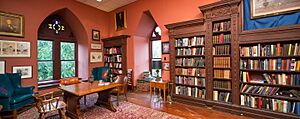
The Philomathean Society, started in 1813, is the oldest student literary society in the United States. It still holds talks and intellectual events for the public.
The Daily Pennsylvanian is an independent, student-run newspaper. It has been published daily since 1885. The newspaper stopped publishing during World War II. In 1984, the university gave up control of the newspaper. The Daily Pennsylvanian has won many awards. It also publishes a weekly arts magazine called 34th Street Magazine.
The Penn Debate Society (PDS) is Penn's debate team. It was founded in 1984. The team competes regularly in national and international debates.
The Penn History Review is a journal published twice a year. It features historical research by undergraduate students. It was founded in 1991.
Penn Electric Racing
Penn Electric Racing is the university's Formula SAE (FSAE) team. They compete in an international electric vehicle (EV) competition. The team designs, builds, and races custom electric racecars. In 2015, their first racecar, REV1, won first place. They also won second place in 2016 with REV2. REV3 won first place in 2017.
Performing Arts Groups
Penn has many groups that promote the arts. These include dance, spoken word, jazz, comedy, and theater. The Performing Arts Council (PAC) oversees 45 student groups.
Penn Glee Club
The University of Pennsylvania Glee Club, started in 1862, is one of the oldest continuously running glee clubs in the United States. It is the oldest performing arts group at Penn.
Each year, the Penn Glee Club creates a Broadway-style show. It includes Penn songs, Broadway classics, and pop hits. The Glee Club members are undergraduate and graduate students.
The Penn Glee Club has traveled to almost all 50 states and over 40 countries. They have appeared on national television with famous people. They have also sung for many world leaders.
Penn Band
The University of Pennsylvania Band has been part of student life since 1897. The Penn Band mainly performs at football and basketball games. They also play at university events like graduation. It was the first college band to perform at Macy's Thanksgiving Day Parade. They have performed with famous musicians.
Penn's A Cappella Groups
The A Cappella Council (ACK) has 14 a cappella groups. Penn's a cappella groups sing pop, rock, R&B, jazz, Hindi, and Chinese songs. Off The Beat has won many awards for collegiate a cappella. Penn Masala, formed in 1996, is the world's oldest South Asian a cappella group. They have performed for many important people. They also appeared in the movie Pitch Perfect 2.
Comedy Groups
Mask and Wig, founded in 1889, was the oldest all-male musical comedy group. In 2021, the club voted to include all genders.
Bloomers comedy group, founded in 1978, was the first all-women college musical and sketch comedy group. Bloomers now accepts anyone who does not identify as a cisgender man. They perform sketches and shows almost every semester.
Religious and Spiritual Groups
Several religious and spiritual groups are active on Penn's campus:
- Mainstream Protestantism: The Christian Association (CA) started in 1857. It is mainly for students from Protestant backgrounds.
- Judaism: Jewish life on campus is centered at Penn's Hillel International branch. It helps students explore Judaism and provides religious communities. The Chabad Lubavitch House at Penn also brings Jewish students together.
- Roman Catholicism: The Penn Newman Catholic Center, founded in 1893, supports students, faculty, and staff in their religious journeys.
- Hinduism and Jainism: Penn funds several clubs for students who are Hindu or Jain. These include the 'Penn Hindu & Jain Association'. They host events like the Holi Festival.
- Islam: The Muslim Students' Association (MSA National) and Penn's MSA chapter were founded in 1963. They help Muslim students build faith and community. Penn also has a full-time Muslim chaplain.
- Buddhism: Penn has a Buddhist chaplain and funds the Penn Meditation and Buddhism Club. This club helps students practice mindfulness and learn about Buddhism.
Athletics
Penn's sports teams are called the Quakers. They are also often called "The Red and Blue." The athletes compete in the Ivy League and Division I of the NCAA. They have often won championships in football and basketball. The first sports team at Penn was the cricket team, formed in 1842.
The rowing team started in 1854. It became an official Penn team in 1879. The rugby football team began playing other colleges in 1874. They used a mix of soccer and rugby rules.
Baseball
Penn's first baseball team was formed in 1875. Penn has won four championships in the Eastern Intercollegiate Baseball League. Since 1992, Penn baseball has won an Ivy League title. They have also played in the NCAA Division I Baseball Championship five times.
Basketball
Penn basketball has a long history. Penn was recognized as a national champion for the 1919–20 and 1920–21 seasons. Penn made it to the Final Four in 1979. Penn's team is also part of the Philadelphia Big 5. In 2007, the men's team won its third Ivy League title in a row. Penn last played in the NCAA tournament in 2018.
Cricket
The first Penn cricket team was formed in 1842. It is believed to be the first cricket team in the U.S. made only of Americans.
On May 7, 1864, Penn played its first intercollegiate game against Haverford College. This was one of the oldest college sports contests. Penn won the Intercollegiate Cricket Association championship 23 times.
In the 1890s, Penn's cricket team often toured Canada and the British Isles. George Patterson (class of 1888) was a famous Penn cricket player. He still holds a North American batting record.
Cricket declined after World War I. Penn stopped fielding a team in 1924. However, in 2009, Penn started a club cricket team again. They were the first to win a tournament for Ivy League teams.
Curling
The University of Pennsylvania Curling Club qualified for the 2023 National Championship. They finished in 2nd place in 2022. In 2023, the team won the national championship. They beat Princeton University 6 to 3. Penn Curling also won the National Championship in 2016. They are the only East Coast team to win this championship.
Football
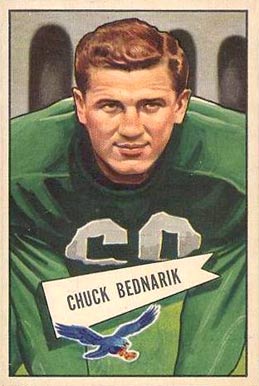
Penn first had a football team on November 11, 1876. They played against Princeton.
In the 1890s, Penn's coach George Washington Woodruff introduced new plays. These included the quarterback kick, an early version of the forward pass.
Two other great Penn players from that time were John Heisman and John Outland. The Heisman Trophy and the Outland Trophy are named after them. These awards go to top college football players.
The Bednarik Award is named after Chuck Bednarik. He was a three-time All-American at Penn. This award goes to college football's best defensive player.
Penn's game against University of California, Berkeley on September 29, 1951, was the first college football game broadcast in color.
Ice Hockey
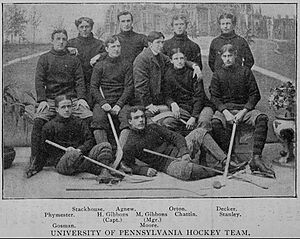
Penn's first ice hockey team played in the 1896–97 school year. They joined the Intercollegiate Hockey Association in 1898–99. The first team included George Orton, who was the first disabled person to compete in the Olympics. Penn had varsity teams until 1977. Now, Penn has a club team. They play at the Class of 1923 Arena in Philadelphia.
Olympic Athletes
At least 43 Penn alumni have won 81 Olympic medals. Twenty-six of these were gold medals. Penn won most of its early Olympic awards at the 1900 Summer Olympics in Paris. In the 2024 Summer Olympics in Paris, 13 Penn students or alumni participated. They competed in 5 sports for 7 different countries.
Rowing
Rowing at Penn started around 1854. The university now has men's and women's rowing teams. They compete in the Eastern Sprints League. Ellis Ward was Penn's first intercollegiate crew coach from 1879 to 1912. His crews won 65 races.
Penn Rowing has produced many famous coaches and Olympians. Penn crew members won a bronze medal for the United States at the 1924 Summer Olympics.
Joe Burk (class of 1935) was captain of Penn's crew team. He won the Henley Diamond Sculls twice. He was also Penn's coach from 1950 to 1969. The 1955 Men's Heavyweight 8 team, coached by Joe Burk, won the Grand Challenge Cup.
Other Penn Olympic athletes and coaches include John Anthony Pescatore and Susan Francia. John B. Kelly Jr., brother of Princess Grace of Monaco, also won a bronze medal at the 1956 Summer Olympics.
Penn's men's crew team won the National Collegiate Rowing Championship in 1991. A member of that team, Janusz Hooker, won a bronze medal for Australia at the 1996 Summer Olympics.
Rugby
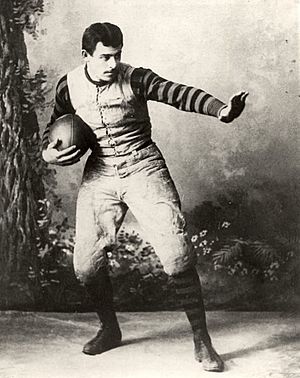
The Penn men's rugby football team is one of the oldest college rugby teams in the United States. Penn first played rugby in the mid-1870s. Their early games used rules similar to modern rugby. One of their first games was against the College of New Jersey (now Princeton University) in 1876.
John Heisman, for whom the Heisman Trophy is named, played rugby at Penn. He later helped change the rules to create modern American football. Another teammate was Harry Arista Mackey, who later became Mayor of Philadelphia.
Rugby was brought back to Penn in 1906 by Frank Villeneuve Nicholson. He had captained the Australian national rugby team.
Penn's men's rugby team plays in the Ivy Rugby Conference. They have been runners-up in both 15s and 7s. They won the Ivy Rugby Tournament in 1992. The team uses the facilities at Penn Park. Penn's rugby team played on national TV at the 2013 Collegiate Rugby Championship. They won the Shield Competition, beating Temple University.
Penn's graduate business and law schools also had rugby teams. The Wharton rugby team has competed since 1978.
Sports Facilities
Franklin Field can seat 52,593 people. It is where the Quakers play football, lacrosse, and track and field. It is the oldest stadium still used for college football games. It was the first stadium to have two levels and a scoreboard. It was also the first to broadcast a football game on radio and TV. Franklin Field hosted the Philadelphia Eagles from 1958 to 1970. Since 1895, it has hosted the annual "Penn Relays," the oldest and largest track and field competition in the U.S.
Penn's Palestra is the home gym for the Penn Quakers men's and women's basketball and volleyball teams. It also hosts wrestling and other sports events. The Palestra has hosted more NCAA Tournament basketball games than any other facility.
Penn's River Fields has several sports fields. These include the Rhodes Soccer Stadium and the Ellen Vagelos C'90 Field Hockey Field. Penn baseball plays its home games at Meiklejohn Stadium.
Penn's Class of 1923 Arena was built for the ice hockey team. It can seat up to 3,000 people. It now hosts Penn's club ice hockey teams. It has also hosted practices for professional hockey teams and concerts.
Notable People
Penn alumni, faculty, and trustees have achieved great things. They have excelled in science, academics, politics, business, and sports.
Since its founding, Penn has been connected to many important figures. This includes eight Founding Fathers of the United States who signed the Declaration of Independence. Seven others signed the United States Constitution.
Penn alumni include two presidents of the United States (William Henry Harrison and Donald Trump). Many U.S. senators, representatives, and governors also attended Penn. As of 2023, 38 Nobel Prize winners have been connected to the university.
Before becoming president of the United States, Joe Biden was a professor at Penn. He led the Penn Biden Center for Diplomacy and Global Engagement.
Nine foreign heads of state attended Penn. This includes the first president of Nigeria, Nnamdi Azikiwe, and the current president of Ivory Coast, Alassane Ouattara.
Penn alumni or faculty also include three United States Supreme Court justices. These are William J. Brennan, Owen J. Roberts, and James Wilson.
Famous Penn alumni in business and finance include Warren Buffett (CEO of Berkshire Hathaway) and Elon Musk (CEO of Tesla and founder of SpaceX). Sundar Pichai (CEO of Alphabet and Google) also attended Penn.
Penn alumni have won many awards in the arts. This includes 53 Tony Awards, 17 Grammy Awards, and 25 Emmy Awards. They have also won 13 Oscars. John Legend is a Penn alumnus who has won an EGOT (Emmy, Grammy, Oscar, Tony).
In the military, Penn alumni include Samuel Nicholas, who founded the United States Marine Corps. William A. Newell helped form a group that led to the current United States Coast Guard. Two Penn alumni have been NASA astronauts. Five Penn alumni have received the Medal of Honor.
At least 43 Penn alumni have won 81 Olympic medals.
Penn's alumni also include poets Ezra Pound and William Carlos Williams. Civil rights leader Martin Luther King, Jr. and linguist Noam Chomsky also attended Penn. Famous actresses like Candice Bergen and Elizabeth Banks are also alumni.
Alumni Organizations
Penn has over 120 international alumni clubs in 52 countries. These clubs help alumni connect and participate in events. Penn also bought a 14-story building in New York City in 1989. This building houses Penn's largest alumni chapter, the Penn Club of New York.
See also
 In Spanish: Universidad de Pensilvania para niños
In Spanish: Universidad de Pensilvania para niños
- Education in Philadelphia
- List of universities by number of billionaire alumni
- Think Tanks and Civil Societies Program (TTCSP)
- University of Pennsylvania Press


